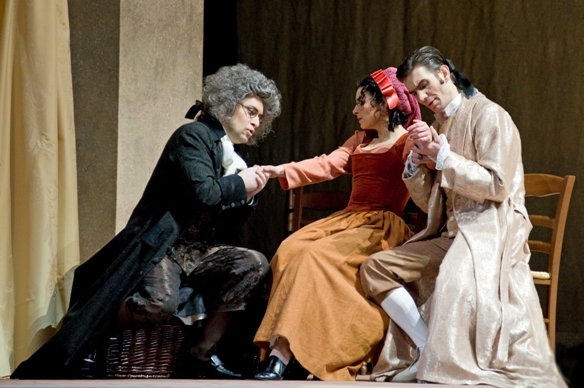
Meet Figaro. Figaro is a barber by trade, but he’s moved up in the world and become a valet, employed by his old buddy the Count Almaviva. In fact it was Figaro who helped the Count win the hand of his wife, named Rosina, now the Countess. Now it’s Figaro’s turn to get married, to his sweetheart Susanna, who is lady’s-maid to the Countess. You might think that the Count, having found his own bride, would be a decent guy and stay away from the lovely young Susanna, but these are the days when the droit du seigneur was still fresh in the memories of naughty noblemen such as the Count. While he tries to woo Susanna into a nighttime tryst, she, Figaro and the Countess team up – breaking through the great social divide – to teach the Count a lesson.
These are the colorful characters you’ll meet in Mozart’s The Marriage of Figaro, starting at the Israel Opera next week. The parade of crazy characters doesn’t stop there – we also have Cherubino, the young lovestruck page who can’t stop gawking at the ladies of the palace, Antonio the tipsy gardener who almost spoils everything, conniving Bartolo and Marcellina and more.
Figaro has been getting married on operatic stages worldwide since 1786 and we still can’t get enough of him – Le nozze di Figaro is the 9th most performed opera in the world according to the Operabase database. This production is being brought to us in a tour of the Lithuanian National Opera, and will be conducted by Martynas Staškus and directed by Emilio Sagi.
Underneath the many catchy tunes and screwball plot of Le nozze di Figaro lies a surprisingly modern criticism of the 18th century social structure – surprising mostly in that it didn’t get banned. The idea of making fun of the aristocracy appealed to Mozart greatly, but in this case it originated not with him but with the author of the original Figaro theater-trilogy, Pierre Beaumarchais. The theater version of The Marriage of Figaro was actually much more radical, and both Georges Danton and Napoleon Bonaparte later credited it with helping kick off the French Revolution.
While opera lovers (like this one) can listen to this opera time and time again, it’s also the perfect First Opera – fast plot, fun and familiar melodies, and the rare and elusive element of a totally happy ending. Or so one might think – we’ll leave the readers to do their own research into the lesser-known PART 3 of the Beaumarchais trilogy, not presented in this opera, in which some very surprising twists occur…
Come and see poor Figaro’s insanity of a wedding day at the Israel Opera, November 4-15. As always, backstage tours, pre-performance lectures and post-performance talks will take place on select dates. For more info and for ticket purchases, visit www.israel-opera.co.il.
Performances: Wednesday, November 4th at 20:00; Thursday, November 5th at 20:00; Friday, November 6th at 13:00; Saturday, November 7th at 20:00; Sunday, November 8th at 20:00; Tuesday, November 10th at 20:00; Wednesday, November 11th at 20:00; Thursday, November 12th at 20:00; Friday, November 13th at 13:00; Saturday, November 14th at 20:00; Sunday, November 15th at 20:00.
Ticket prices: 190, 252, 319, 388, 438 NIS





